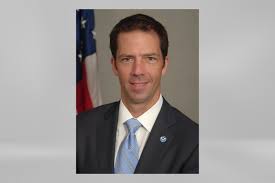Neil Jacobs, Linked to ‘Sharpie-Gate’ Controversy, Appointed Head of NOAA by Trump
Neil Jacobs, who served as the acting administrator of the National Oceanic and Atmospheric Administration (NOAA) in 2019, has been chosen by former President Donald Trump once again to lead the agency.
Jacobs, an experienced atmospheric scientist, has worked in both the public and private sectors for over 20 years. Despite the controversy surrounding the “Sharpie-gate” incident, Jacobs has remained a prominent figure in atmospheric science. An inspector general’s report from the Department of Commerce, which oversees NOAA, also criticized Jacobs and other NOAA leaders for their handling of the situation, raising questions about the integrity of the agency’s leadership during the controversy.
Nonetheless, Trump has now appointed Jacobs once again to lead NOAA, signaling confidence in his leadership despite the past criticism.

On September 1, 2019, as the National Weather Service was issuing forecasts indicating that Hurricane Dorian would move up the Atlantic coastline, President Donald Trump made an erroneous claim on Twitter, stating that Alabama was in the storm’s path. This tweet contradicted official forecasts and caused confusion.
Later that same day, the National Weather Service’s office in Alabama took to Twitter to clarify the situation, explicitly stating, “Alabama will NOT see any impacts from #Dorian,” in an effort to correct the misinformation. Despite this correction, President Trump continued to assert that Alabama was at risk.
Three days later, on September 4, President Trump reiterated his claim, presenting a map of the storm’s projected path from a week earlier. The map, which had been altered with a black marker, depicted the hurricane potentially heading toward Alabama. Trump insisted that this was the “original chart,” and argued that the storm had once been predicted to hit not only Georgia and Florida but also move toward the Gulf, implying that Alabama had been in danger at that time. This prompted widespread criticism and scrutiny, as the altered map and the persistent claim about Alabama’s risk conflicted with the accurate forecasts provided by meteorologists.
Ultimately, Hurricane Dorian did not make landfall in the United States, nor did it come anywhere near Alabama, rendering President Trump’s initial claim about the storm’s path inaccurate. However, in the aftermath of the controversy, the leadership at the National Oceanic and Atmospheric Administration (NOAA issued a statement that seemed to support Trump’s position. The statement not only backed the president’s assertion but also criticized the work of NOAA’s own weather forecasters. This unusual move stirred further debate and raised questions about the agency’s independence and the influence of political pressure on its scientific assessments. The statement contradicted the forecasts issued by meteorologists, which had accurately predicted that Alabama would not be affected by the hurricane.
The inspector general’s report criticized the statement issued by NOAA leadership, stating that it “unnecessarily rebuked NWS forecasters” for simply doing their jobs and accurately predicting the hurricane’s path. Both the inspector general’s report and an investigation by a panel from the National Academy of Public Administration concluded that the statement, which backed President Trump’s inaccurate claims about the storm, was influenced by external political pressure. Specifically, the reports indicated that the statement was driven by a request from then-White House Acting Chief of Staff, which led NOAA’s leadership to act in support of the president’s narrative.
The reports also noted that Neil Jacobs, who has been nominated once again to lead NOAA, violated the agency’s ethical guidelines. According to the findings, Jacobs failed to involve the Birmingham Weather Forecast Office (WFO) in developing the September 6 statement, a failure that contravened NOAA’s Scientific Integrity Policy. This action was deemed to be a breach of the Code of Ethics for Science Supervision and Management, which is designed to ensure that scientific decision-making is independent and free from political influence.
The National Academy report went further, stating that Jacobs’ actions constituted misconduct, either intentionally, knowingly, or with reckless disregard for the ethical standards set by NOAA. Jacobs, however, expressed that he felt significant pressure to support the statement, fearing that if he did not, NOAA would issue a statement that was even more damaging and inflammatory. According to the inspector general’s report, Jacobs believed that if he resigned or was removed from his position, the final statement would likely have been worse. This perception of pressure led him to reluctantly go along with the controversial statement, despite his own reservations about its accuracy.
Despite the controversy surrounding the “Sharpie-gate” incident, some weather professionals at the American Meteorological Society meeting in New Orleans expressed their support for Neil Jacobs. Several attendees, speaking with The Associated Press, conveyed their hope that President Trump would choose Jacobs again to lead NOAA. One such supporter, Victor Gensini, a professor of meteorology at Northern Illinois University, praised the potential appointment, stating, “I think the Neil Jacobs appointment is a strong pick.” These comments reflect a degree of confidence in Jacobs’ qualifications and leadership in the field of atmospheric science, despite the previous criticism tied to the incident.


Comments are closed, but trackbacks and pingbacks are open.